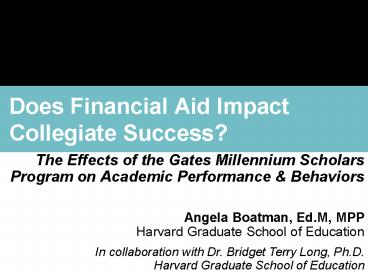Does Financial Aid Impact Collegiate Success - PowerPoint PPT Presentation
1 / 16
Title:
Does Financial Aid Impact Collegiate Success
Description:
Harvard Graduate School of Education. Gates Millennium Scholars: Background. Background ... Education. boatmaan_at_gse.harvard.edu. Prof. Bridget Terry Long, Ph. ... – PowerPoint PPT presentation
Number of Views:55
Avg rating:3.0/5.0
Title: Does Financial Aid Impact Collegiate Success
1
Does Financial Aid Impact Collegiate Success?
- The Effects of the Gates Millennium Scholars
Program on Academic Performance Behaviors
Angela Boatman, Ed.M, MPP Harvard Graduate School
of Education In collaboration with Dr. Bridget
Terry Long, Ph.D. Harvard Graduate School of
Education
2
Gates Millennium Scholars Background
Background
- Established 1999 and funded by 1 billion grant
from The Bill Melinda Gates Foundation - Renewable last-dollar scholarship
- Targets talented students of color who will be
1st-time, fulltime college students (2000-02
means) - African American 36 Hispanic American 29
- Asian American 26 American Indian 9
- Pell Grant eligible (family income lt40,000)
- Cumulative HS GPA of 3.3 on 4.0 scale or GED
- Selects finalists based on academic achievement,
community service, and leadership potential - Over 4,000 applicants each year / 1,000 chosen
3
Previous GMS Research
Prior Research
- GMS improved odds of continuous enrollment (St.
John Chung, 2002) - GMS students had fewer work hours/ week and
higher retention rates (DesJardins McCall,
2007) - Scholars spend more time in extracurricular
activities than non-recipients (Hurtado, Laird,
Perorazio, 2005) - Contributions of this work
- More complete definition of student success
- Further identifies how/ where students are
spending their time
4
Research Question
Research Question
- Could aid impact persistence and academic
success, particularly among low-income students?
- Studying the Gates Millennium Scholars Program
- A scholarship to talented students ? Unique
opportunity to examine the causal impact of
financial aid on persistence apart from other
influences - Focus on more than just academic performance
What behaviors are affected by financial aid? - Designed to allow comparisons of aid recipients
to similar students who did not receive the aid
5
Research Methodology Part 1
Research Methodology Part 1
- Goal Identify similar students who did not
receive - Comparison Group 1 Applicants who made it to
the final round of consideration but were not
selected for a GMS award - Students making it to the final round
- Cohort 1 100
- Cohort 2 87
- Cohort 3 61
- Comparison Group 2 Applicants who met certain
thresholds of achievement - Drop students with little chance of receiving the
award - Non-cognitive assessment of at least 69 AND an
SAT score of at least 900 or an ACT score of at
least 17
6
How do the outcomes of GMS Scholars compare to
Non-recipients?
Research Methodology Part 1
- OLS model
- Yi ß0 ß1GMSi ß2Backgroundi
ß3Preparationi ß4Scorei ß5Collegei ei - Background Gender, Race, 1st gen. college
student, Max. level of parents education,
Parents own or rent, Student attended private HS - Preparation SAT/ACT percentile, AP exams in HS
- Score Total score on GMS assessment
- College Public or private college, Selectivity
7
Research Methodology Part 2
Research Methodology Part 2
- Goal Identify similar students who did not
receive - Comparison Group 3 Applicants just above and
below the cutoff for making it to the final round
of consideration ? Regression Discontinuity
Approach
0.804
0.670
0.571
Probability of Receiving GMS
0.431
0.301
0.197
8
Research Methodology Part 2
Research Methodology Part 2
Use Instrumental variables (TSLS) regressions to
estimate the effects of GMS on academic outcomes
Predicted Hours Spent Studying by Assessment Score
Predicted Hours Spent Studying
Effect of Receiving GMS
Assessment Score
9
Data Overview and Outcomes
Data
- Collected by NORC (National Opinion Research
Center) - Three cohorts fall 2000, 2001, 2002
- Surveyed at three points Spring semester of 1st
year, 3rd year, and 5th year - Approx 3,000 observations per cohort
- Outcomes
- Academic Behaviors Time spent studying
Attending tutoring sessions - Academic Performance GPA in 3rd year Total
credits completed 1st year - Extracurricular and Social Behaviors Community
service residence hall involvement
10
Sample Summary Statistics (Cohorts 1-3)
11
Time Spent Studying 1st Year
Results
Comparison Groups 1 and 2 Using OLS Regressions
Comparison Group 3 Regression Discontinuity
Approach
12
Attending Tutoring Sessions 1st Year
Results
Comparison Groups 1 and 2 Using OLS Regressions
Comparison Group 3 Regression Discontinuity
Approach
13
Community Service 3rd Year
Results
Comparison Groups 1 and 2 Using OLS Regressions
Comparison Group 3 Regression Discontinuity
Approach
14
Summary of Results
Results
- GMS recipients spent more time studying per week
and participating in tutoring sessions than
non-GMS peers (even after controlling for
institutional selectivity) - Reported less difficulty with their coursework
- Weak evidence that GMS students completed more
college credits in their 1st year and had higher
3rd year GPAs - GMS recipients report spending more time engaged
in community service and residence hall
activities than their non-GMS peers
15
Future Research
Further Research
- Additional cohort of data (cohort 5)
- Examine how the effects differ by prior
preparation, race, and gender - Early analysis suggests the performance gains are
concentrated among students with relatively less
prior preparation - Investigate ways in which the program
administration may have changed over time
16
Questions/ Comments
Contact Information
- Angela Boatman, Ed.M, MPP, Ed.D. Candidate
- Harvard Graduate School of Education
- boatmaan_at_gse.harvard.edu
- Prof. Bridget Terry Long, Ph.D.
- Harvard Graduate School of Education, NBER, and
NCPR - longbr_at_gse.harvard.edu

